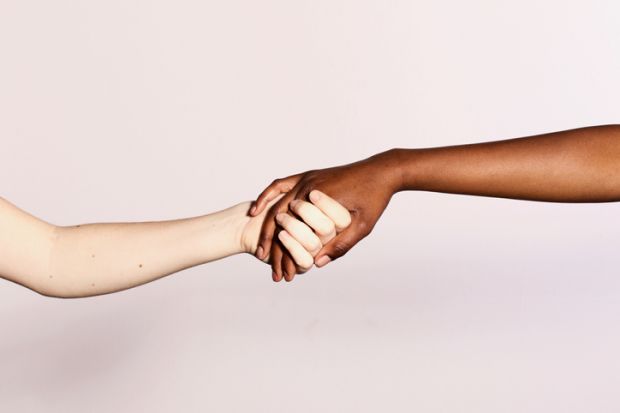A new book calls on white academics to engage in “meaningful collaborations” with black colleagues in order to break down long-established structures of “whiteness and privilege”.
Deborah Gabriel, senior lecturer in marketing and communications at Bournemouth University, is also a consultant in educational equity and the founder and director of Black British Academics. Her new collection, Transforming the Ivory Tower: Models for Gender Equality and Social Justice, brings together contributors from Australia, Canada and the US as well as the UK. It is designed to demonstrate, she explained, how “black and brown women are active agents of change”. Much of it explores “self-reparation” and “the work we are doing among ourselves for our own empowerment, giving us voice and visibility, enabling us to tell our truths…But going forward, we will be focusing on projects that facilitate political and economic empowerment.”
In response to the 2017 collection she edited with Shirley Anne Tate, Inside the Ivory Tower: Narratives of Women of Colour Surviving and Thriving in British Academia, Dr Gabriel reports in her new book, she had “many responses, especially from white male academics, [saying] they found our narratives constructive and insightful” or “offering support”. Yet she was “frustrat[ed] that whiteness and privilege remain intact and stronger than ever” – as indicated, for example, by the fact that “93 per cent of professors [in the UK] are white”.
She ends the new book, therefore, with a call for “meaningful dialogues and collaborations with white colleagues [while] refus[ing] to engage with tokenistic gestures that make no real contribution to challenging the status quo”.
It was “a waste of time”, in Dr Gabriel’s view, when universities complicit in racism “jumped on the Black Lives Matter bandwagon because of pressure from students”. Instead, within a broad “focus on truth, justice, reparation and equity”, she wanted to see white academics using their privilege to speak up in institutions where there were no black staff above a certain level.
Universities needed to put in place “specific, concrete and measurable” initiatives such as reparative academic development programmes, she said; these could select five or 10 black graduates each year and give them additional support alongside their master’s courses with a view to increasing the number of black academics by 10 or 20 over the next three to five years.
Instead of conferences that scrambled around to assemble a diverse panel of speakers at the last moment, Dr Gabriel asked, “Why aren’t we involved from the outset so we can help shape it?” As a positive example, she cited a 2018 event at London South Bank University to mark the centenary of some women getting the vote in the UK, where she was pleasantly surprised that “the keynote speaker talked about race from the very beginning – it wasn’t just added on at the end. I told them it was the first event I had attended that looked as if it was developed from the ground up from a very culturally democratic position.”
It was also crucial, as Dr Gabriel saw it, for university leaders to “take more responsibility” and to “start holding deans and managers accountable…for advancing the cause of inclusivity and equality in teaching, research or professional practice”, when all too often “faculty regimes – the policies, the procedures, the key performance indicators – actually create a black underclass”. She would even like to see financial penalties, perhaps imposed by the Office for Students, for “institutions not improving the pay gap. Only financial measures motivate institutions to change”.
Register to continue
Why register?
- Registration is free and only takes a moment
- Once registered, you can read 3 articles a month
- Sign up for our newsletter
Subscribe
Or subscribe for unlimited access to:
- Unlimited access to news, views, insights & reviews
- Digital editions
- Digital access to THE’s university and college rankings analysis
Already registered or a current subscriber? Login








